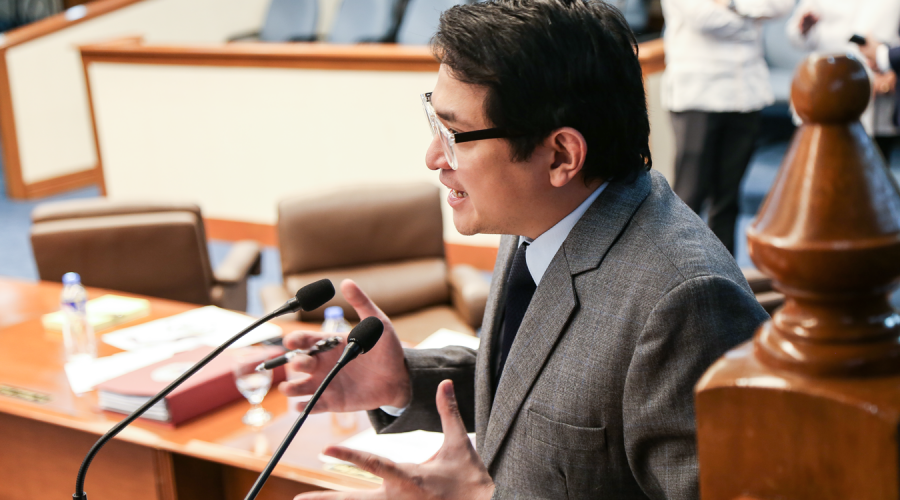bam aquino on tax reform
Sen. Bam Aquino’s Explanation of No-Vote for TRAIN Ratification
Thank you, Mr. President.
First of all, Mr. President, let me just say that my no vote at the ratification is by no means an indication of the leadership and the diligence of our Chairman. Our Chairman worked very hard for this bill, and I believe he really did his best to come up with the best version that he could, with the circumstances given to him.
However, Mr. President, if I I could explain my vote, the DOF knows that there was really one major provision or one major aspect of this bill that was important to this representation. At yun, Mr. President, yung epekto ng batas na ito sa napakaraming mahihirap sa ating bansa.
Totoo po, Mr. President, merong 6 million Filipinos ang matutulungan ng batas na ito. 6 million Filipinos, in fairness, Mr. President, and will congratulate this portion of the bill, will go to the larger take-home pay. However, Mr. President, in the records of the Department of Finance, in their deliberations, in their presentations to the individual senators, lumalabas po talaga na dahil sa pagtaas ng bilihin, we’re looking at the bottom 40% of the Filipino people who will carry the brunt of the tax reform because of the increase in prices.
Now, Mr. President, a lot of us have raised this issue. At yung na-mention po ng DOF na tulong sa ating mga kababayan ang unconditional cash transfer. In short, Mr. President, yung pang-balanse sa napakaraming pamilyang Pilipinong naghihirap dahil sa pagtaas ng presyo ng bilihin, at yung pagbibigay ng 200, or- ngayon po 200 pero initially in the Senate version 300 pesos per month na tulong, financial assistance to the bottom, roughly 10 million families to help them with the increase in prices because of the tax reform. Mr. President, with that assertion, marami po sa atin, napanatag ang kalooban.
However, Mr. President, lumabas po doon sa ating interpolation, at lumabas po doon sa ating pananaliksik ng DOF at ng iba pang mga ahensya, na hindi po kayang i-implement ang programang iyon na kasabay sa pagtaas ng presyo ng ating bilihin.
And Mr. President, yun po siguro yung isang bagay na para sa akin, hindi ko pwedeng suportahan ang batas na ito kung hindi maisasabay ang tulong na pinansyal sa ating mga kababayan doon sa pagtaas ng taxes ng napakaraming produkto sa ating bansa. And I hope, Mr. President, this no-vote will spur our agencies to work faster, and this is, of course, DOF, DSWD, and other concerned agencies, na sana po, hindi gaya ng sabi nila, na hindi kayang isabay ang programa doon po sa pagtaas ng presyo ng mga bilihin. Sana po mahanapan pa po nila ng paraan, na sa madaling panahon, masabay po nila yung programang tulong na pinansyal sa mga kababayan natin doon po sa pagtaas ng taxes sa napakaraming presyo, sa napakaraming bilihin sa ating bansa. And because of that, Mr. President, I, unfortunately, cannot support this measure. Thank you, Mr. President.
Sen. Bam: Shield the poor from admin’s tax increases
How about the country’s poor?
Senator Bam Aquino raised this question as he opposed moves to remove the earmarking provision of the Tax Reform for Acceleration and Inclusion (TRAIN), which is aimed at helping country’s poor cope with the expected increase in prices of goods and services brought about by the government’s proposed tax measure.
“This tax measure will hit the poorest of our countrymen the hardest. It’s necessary on our part to have the earmarking and an effective cash transfer program para sa ating mahihirap na kababayan,” said Sen. Bam during the period of amendments for TRAIN.
Earmarking allots parts of revenues generated from the tax measure to several priority programs, including financial assistance to the country’s poor through an unconditional cash transfer program to help them cope with the expected price increase once the measure is enacted into law.
Based on computation, the country’s poor will be given a P300 monthly financial assistance for a certain period of time to help cover the increase in prices of basic goods due to additional tax on sugar beverages and petroleum.
“Kailangan matiyak na mayroong makukuhang tulong kada buwan mula sa pamahalaan ang mga mahihirap na pamilya upang mabalanse ang pagtaas ng presyo ng bilihin. Kung hindi natin gagawin iyan, we will be passing a measure which will hit our poorest countrymen the worst,” Sen. Bam stressed, adding that the Department of Finance itself presented the cash transfer program as the best solution to help the country’s poor cope with the increase in prices.
During the period of amendments, Sen. Bam committed to present proposals on how to ensure that the welfare of the country’s poor will be protected under this tax reform program.
“Kailangan nating isipin ang kapakanan ng mga kababayan nating mahihirap na siyang tatamaan nang husto sa pagtaas ng presyo ng bilihin,” said Sen. Bam.

Recent Comments